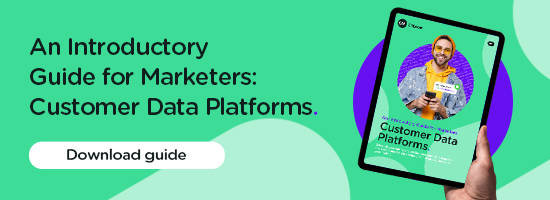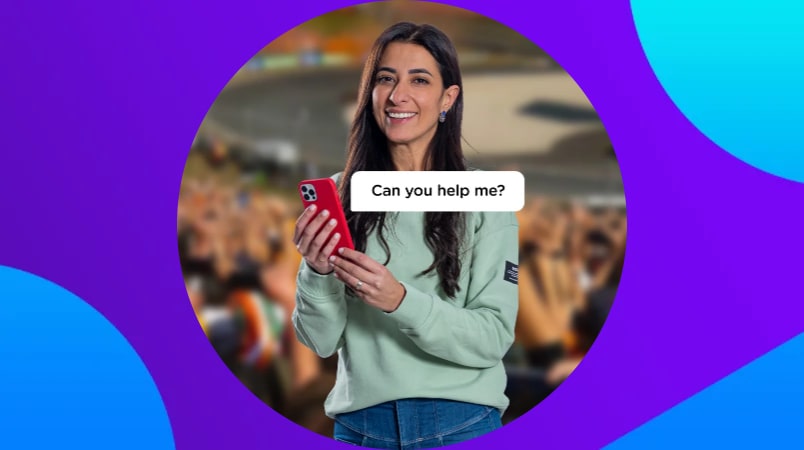CDPs are distinct from CRM and DMP solutions and offer more detailed profile creation and more effective targeting. But how do you use a CDP in the best way for your business? We’ve rounded up some use cases for a variety of industries so you can see how a CDP can improve the ROI of your marketing.
1. Hospitality
The Office of National Statistics found that spending on hospitality has, predictably, increased in 2021 compared to 2020. However, in the first half of this year, it remained at less than 70% of pre-pandemic levels. Competition for this reduced revenue is fiercer than it’s ever been. Using your CDP effectively is one way to ensure you’re ahead of the game.
Cancellations are part and parcel of the hospitality industry, but being able to hold a vast amount of data on prospective customers means that when you do have a cancellation, you can turn to your CDP to find out who to approach to fill those vacancies; whether that’s enquiries you’ve had to turn away, or loyal customers you could offer a discount to.
If you’re struggling with low turnover per guest, knowing exactly who they are is a step in the right direction to increasing their spend. Showing them extras that are relevant to their situation will mean they are more likely to convert than from a more scattergun approach.
From a customer service perspective, having all that data at your fingertips means that providing your guests with that personal touch becomes vastly simpler.
2. Sport
Turning casual spectators into lifelong fans is a key part of a sports marketing strategy. Ensuring your fans are willing to dig into their pockets to travel to weekly games and show their support is the lifeblood of many teams and venues.
Sport is big business and fans are bombarded with messages from competing sports organisations on a daily, sometimes hourly basis, all looking to generate ticket and merchandise sales. In situations like this, delivering cut-through is hugely important. It sounds difficult, but simply knowing your fans better than the competition can be the edge you need.
Personalised messaging at the right place and the right time is the way to make yourself heard and your CDP can help you by using the huge amount of data it holds on your customer-base to create rich profiles. These can be marketed to in very specific ways on the platforms they use most often.
3. Retail
Retailers have a hard time competing for share of wallet with giants such as Amazon and eBay mopping up a huge chunk of sales. Getting yourself noticed and generating repeat purchases can be difficult with these giants dominating the landscape. The key is – as ever – personalisation. Showing your customers that you know them better than the competition will encourage them to keep coming back. Thankfully, that’s one thing that the bigger players in the industry are not particularly effective at.
With a CDP, you can collect information on existing and new customers and target them with specific offers, discounts and relevant ‘in stock’ messaging to generate revenue, and encourage loyalty and advocacy. With information at your fingertips from everything from abandoned carts to last-viewed items, you can create a customer persona that allows you to pinpoint your customers’ needs and effectively meet them.
4. Professional services
In the professional services sector, data is the holy grail. With a CDP, you can hold all of your data in one, centralised location, rather than multiple, disparate platforms. Given the importance of good data management within the industry, being able to ensure the security of one location is many times easier than securing multiple data storage points.
In addition, ensuring the data is clean and correct is another industry imperative. A CDP avoids data corruption as a single source of information, guaranteeing that conflicting information isn’t stored across multiple platforms and avoiding, at best, frustration and, at worst, legal ramifications.
Finally, it’s equally important to be familiar with your customers’ personal situations across the sector. A CDP can quickly and easily inform your team of a particular customer’s circumstances, allowing for a personalised service which can increase loyalty and advocacy.
5. Automotive
As the second biggest purchase after a home, the automotive sector is hotly contested and brands need to ensure they provide the right messaging at the right time in order to convert customers.
Knowing what your potential and existing customers want and need from a vehicle is crucial to generating a sale. That’s where a CDP comes into its own, giving you access to huge amounts of personal information that will allow you to create marketing messages that really land with your customers. For example, knowing what time of life a potential car buyer is at can allow you to tailor your recommendations to their needs very effectively. Perhaps they’ve started a family and will be looking to upgrade their vehicle to something bigger. Or maybe they’ve reached retirement age and might have saved up for that elusive sportscar.
In any case, the future of automotive-buying is very much digital, with brands creating new purchase models that can often rely solely on digital research and ecommerce. Creating a data-driven marketing strategy will allow you to reach customers way beyond the showroom and influence their purchase decisions, often before they know they’re ready to make them.
Equally, post-purchase, in the often lengthy period between conversions, communication is key to ensure customer loyalty at the next purchase opportunity.
6. Music
Hit hard by the COVID-19 pandemic, the live music industry is anxious to get back to some form of normality. Now, perhaps more than ever, there are a vast array of options for music fans to enjoy live entertainment. The pandemic has driven many artists online, with streaming gigs becoming more popular. At the other end of the spectrum, festivals are more numerous than ever before and face increased competition at a time they could really do without it. Even the established music events are having to contend with numerous new competitors entering the market and eroding their share of wallet.
In order to shore up existing audiences and reach new ones, data is more important than ever. A Customer Data Platform can afford venues and artists the opportunity to reach new fans and increase the spend of existing ones by targeting loyal fans with discounts and merchandise offers. With a CDP, segmenting audiences into loyal, long-serving fans and newer, more fickle ones, for example, allows personalisation on a level not seen before in the industry and encourages conversion by using targeted messages for different types of audiences. In the case of a festival, for example, knowing the type of music your consumers are likely to listen to makes it possible to use relevant artists to entice them to convert.
7. Real Estate and housing
A CDP can help real estate agents in a number of different ways. Firstly, it allows you to segment your audiences into various groups that you can target effectively. You could target, for example, young professionals, the newly married, retirees, or parents, for example, and serve them content messages that are relevant to their particular situation.
Equally. When you have prospect and customer profiles stored in your CDP, you can very quickly access all the information that you hold on them, allowing you to deliver a bespoke service each time they contact you. It also allows agents that are unfamiliar with a particular customer the opportunity to get up to speed with their situation quickly, without having to ask time-consuming questions. Continually asking your customers the same questions as they are moved through the purchase funnel is not only irritating for them, it also reduces your productivity and can negatively impact customer sentiment and advocacy.
8. Travel
COVID-19 wiped out 90% of international flights during the peak of the pandemic. As a result, many people won’t have travelled internationally for many months and will be relying on tried and tested destinations over the coming 12-24 months.
Accessing legacy travel data is key to providing your customers with the right selection of travel options for their situation. Your CDP can hold a raft of relevant information, including typical spends, favourite destinations and types of accommodation. Using that data, you can deliver targeted messaging based on the information you hold. Some of your audience segments may be more interested in cheap flights and hotels, whereas others will be more concerned about hygiene and distancing measures. Knowing your audience inside out can help you increase conversion rates exponentially.
9. Utilities
Utility companies have some unique challenges – one of which is customer retention. Given tariffs change on a regular basis, and competitors can easily undercut your business with short term introductory deals, it's important to focus on customer service. Getting to know your customers is simple enough to do, provided you have a solution with the flexibility of a CDP. You can create audience segments that allow you to send personalised messages to each group, ensuring your messages reach the right audience at the right time. No one wants to be spammed by a utility provider, but delivering beneficial offers and content will improve customer sentiment.
Clearly, the more segments you create, the more relevant you can make your message. Thankfully, creating these segments and deciding which message to send to each can be automated from within your CDP.
On the flipside, when your customers contact you with an issue, it's crucial that you can deal with it quickly and effectively. Being able to access their data stored within your CDP quickly is key to avoiding frustrated customers and having to ask more questions than you need to.
In addition, holding detailed customer-specific data means that you can alert individual customers of things such as unusual usage levels, or you can work with people who are struggling to pay to give more settlement options. This creates a healthier relationship and improves customer sentiment which ultimately leads to improved retention.
10. Beauty
The beauty industry is no different to any other in that personalisation and relevance are key to driving conversions. Given the UK cosmetic industry has seen massive growth, even during the pandemic, there are big wins to be had if you get your communication strategy right. But as the third largest consumer market in the UK, with retail sales of £8.7m, you can expect some stiff competition.
That’s why effective use of a CDP is crucial. Being able to hold a mass of customer data from a variety of touchpoints allows you to build a complete picture of your consumers. With all that data, you can use your CDP to segment your audience into multiple different strands allowing you to target each one with relevant messages. Given beauty has a huge social following, knowing where your audience is, how your fans communicate, and what they’re interested in is the key to improving engagement in the fast-paced, hyper-competitive world of beauty.
11. Charities
Charity events and face-to-face giving were all but wiped out during 2020 with a £10bn funding shortfall reported at the end of last year. It’s clear then, that charities have to drive digital revenue to survive, which means a Customer Data Platform has become even more important in 2021 and beyond.
There are a number of ways you can use a CDP to increase charitable giving, one being to personalise your messaging via the individual data profiles you hold. With a vast array of data points that can be collected, you can personalise right down to an individual level in order to increase the ROI of your marketing efforts.
Equally, knowing more about your supporters means that you can target them with that personalised message at the right time, and on the right device, and platform. Knowing where your supporters spend their time online means that you can reach them in places where you know they’re already highly engaged, increasing the chances of creating a conversion.










